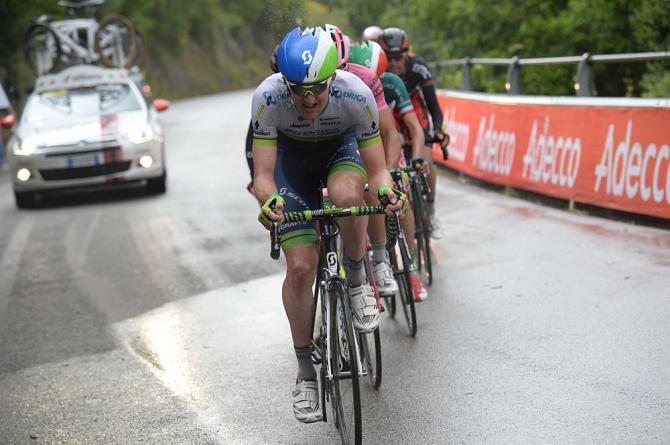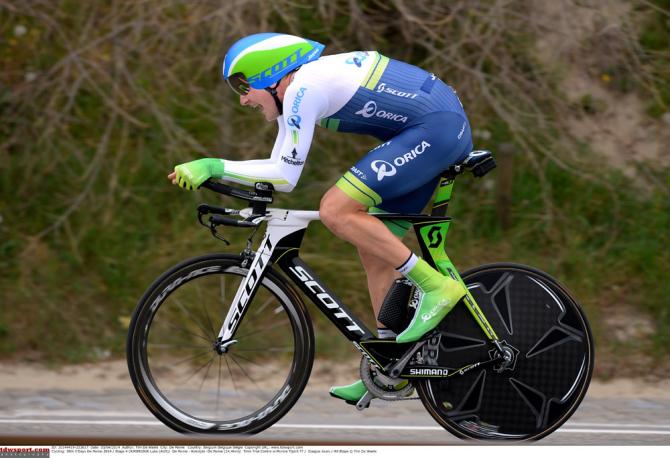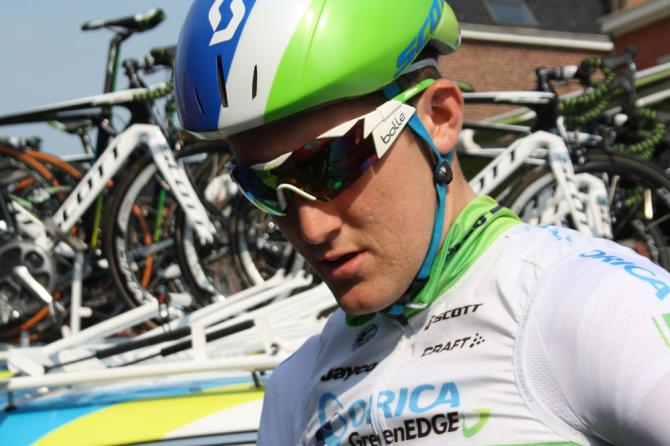Time trial hard to predict for Tour de France debutant Durbridge
Australian on difference between Giro and Tour



A thoroughbred rouleur will always look to manage his resources as best as possible ahead of the final time trial of a grand tour, although Tour de France debutant Luke Durbridge was self-deprecating as he recalled his build-up to Saturday’s penultimate day test.
"As much as possible, you try to find the easiest gruppetto possible and get through the stages – but I think I’d be in the gruppetto anyway as it is," Durbridge told Cyclingnews in Mauborguet on the eve of the Tour’s final time trial.
The 54 kilometre chrono from Bergerac to Perigueux is the sole time trial on this year’s Tour route, but coming as it does on the fourth Saturday of the race, relatively few riders have dared to tempt fate by performing a reconnaissance ahead of time.
"I haven’t seen the course either, so that makes it quite difficult but I’ll take a look at it in the morning," said Durbridge, who finished a fine 6th in the equally long but significantly hillier time trial to Saltara during his grand tour debut at last year’s Giro d’Italia.
Tony Martin (Omega Pharma-QuickStep) is the obvious favourite for stage victory, but on paper, Durbridge is one of the strongest time triallists remaining in the race. He is aware, however, that after three long weeks of racing, a time trial takes on a different dynamic. Natural aptitude can often be trumped by those with high energy levels.
"I’m just going to have a go, but there have been 20 stages already," Durbridge said. "All you’ve got to do is go out there and suffer like a dog. That could be top 50 or that could be top 5. I’m going to go out there and give it everything. I’m going to give it a good red-hot crack, but it’s hard for me to predict my position or where I’m going to come."
Giro versus Tour
The latest race content, interviews, features, reviews and expert buying guides, direct to your inbox!
Durbridge can hardly be said to have enjoyed an ideal build-up to his Tour debut. After helping to power Orica-GreenEdge to victory in the opening team time trial at the Giro d’Italia in Belfast, he sustained a broken collarbone when he crashed out of the race on the eve of the Barolo time trial.
"I had to get straight into training straight after the Giro: I got straight on the home trainer four days after breaking my collarbone so I didn’t lose too much," Durbridge said. "The prospect of doing my first Tour de France was all the motivation I needed."
Durbridge has made it through the three weeks of his debut Tour without ever feeling that he might not reach Paris. The difficulty of the race, to his mind, is a more constant one; the physical and mental toils of the race are simply unyielding.
"I probably haven’t really had a bad, bad day where I thought this might be the end, but I guess every day has just been relentless," Durbridge said. "It hasn’t stopped to be honest. You think one day you might get an easy day but then one team goes to the front and start riding and all of a sudden you’re going warp speed again and it’s bloody hard. Every day, I’ve thought ‘today might not be so bad’ it’s been terrible."
And therein lies the big difference between the Tour and the Giro.
"You don’t get easy days at the Giro but you definitely get huge lulls in the race, when the break goes and you can stop and have a piss," Durbridge said. "But here, I don’t think I’ve stopped and had a piss in the last week."

Barry Ryan was Head of Features at Cyclingnews. He has covered professional cycling since 2010, reporting from the Tour de France, Giro d’Italia and events from Argentina to Japan. His writing has appeared in The Independent, Procycling and Cycling Plus. He is the author of The Ascent: Sean Kelly, Stephen Roche and the Rise of Irish Cycling’s Golden Generation, published by Gill Books.